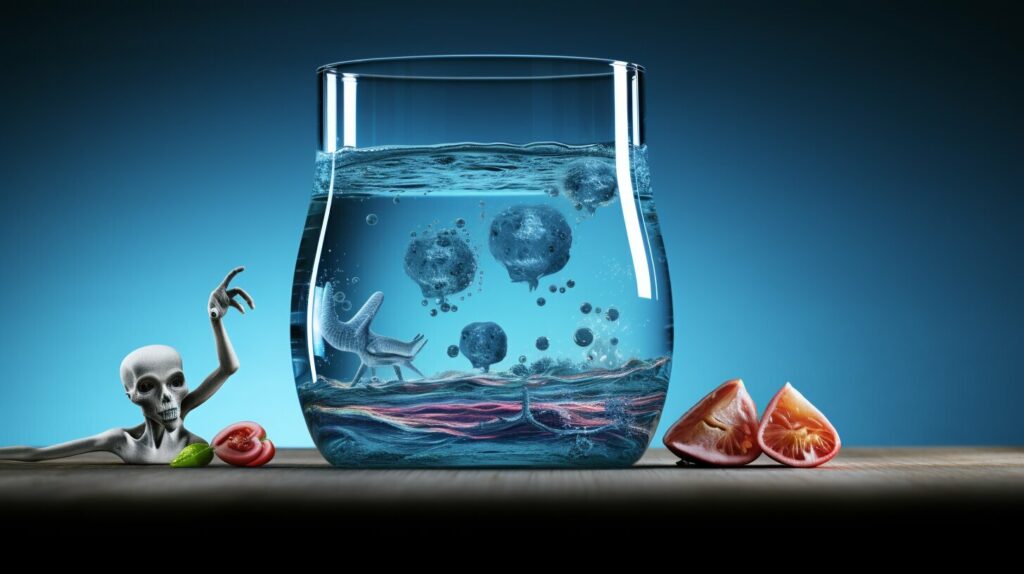Are the claims surrounding the water diet true, or is there more to this weight loss trend than meets the eye? Let’s dive into the potential risks and dangers associated with the water diet.
- The water diet restricts all food intake except water and has gained popularity as a quick weight loss method.
- While water fasting may offer some health benefits, it also carries risks such as potential muscle loss, dehydration, low blood pressure, and worsening of certain medical conditions.
- It is important to seek medical supervision and avoid prolonged water fasting without professional guidance.
- Consider exploring safer alternatives like intermittent fasting, which can offer similar health benefits without the extreme restrictions of the water diet.
- Remember to prioritize your health and consult with a healthcare professional before making any drastic changes to your diet or fasting routine.
Understanding the Water Diet: Pros, Cons, and Potential Risks
Before embarking on any diet, it’s important to understand the potential advantages and disadvantages it may bring. The water diet, also known as water fasting, has gained popularity as a quick way to lose weight and may offer some health benefits. Advocates of the water diet claim that it can promote autophagy, a cellular process that helps remove damaged cells and may reduce the risk of chronic diseases. However, it’s essential to weigh these potential benefits against the risks associated with this extreme form of fasting.
One of the main advantages of the water diet is its potential for rapid weight loss. By only consuming water, your body is forced to burn stored fat for energy, leading to significant weight loss. Additionally, water fasting may improve insulin sensitivity and reduce inflammation in the body, which can be beneficial for overall health. However, it’s important to note that these benefits are mostly based on anecdotal evidence, and more research is needed to validate these claims.
While the water diet may sound appealing, it’s crucial to consider the potential risks involved. Extended periods of water fasting can lead to muscle loss, as your body may break down muscle tissue for energy. Dehydration is another concern, as water is the only source of hydration during the diet. This can lead to electrolyte imbalances, weakness, and dizziness. Furthermore, individuals with low blood pressure or certain medical conditions, such as diabetes or eating disorders, should avoid water fasting or do so under medical supervision.
The Health Risks of the Water Diet
It’s important to be aware of the health risks associated with the water diet. Apart from potential muscle loss and dehydration, existing medical conditions can be exacerbated. For example, individuals with diabetes may experience unstable blood sugar levels, while those with eating disorders may face a higher risk of relapse. Therefore, it is crucial to consult with a healthcare professional before considering the water diet, especially if you have any underlying health concerns.
Considering the potential risks of the water diet, it may be wise to explore safer alternatives. Intermittent fasting, for example, allows for periods of eating and fasting, providing some of the benefits associated with water fasting without the extreme restriction. There are various approaches to intermittent fasting, such as the 16/8 method or alternate-day fasting, which can be tailored to individual preferences and goals. Incorporating intermittent fasting into your lifestyle may offer a more sustainable and balanced approach to weight loss and overall health.

To conclude, the water diet, or water fasting, may offer potential benefits for weight loss and overall health. However, it’s essential to consider the associated risks, such as muscle loss, dehydration, and worsening of certain medical conditions. It is not recommended to water fast without medical supervision, especially for an extended period of time. Exploring safer alternatives, like intermittent fasting, may be a more viable option for those looking to incorporate fasting into their lifestyle. Prioritizing your health and consulting with a healthcare professional is crucial before embarking on any dietary changes.
The Health Risks of the Water Diet
While the water diet may promise quick results, it’s essential to be aware of the potential health risks it can entail. Water fasting, which involves restricting all food intake except water, can have several adverse effects on your body.
One of the primary concerns with the water diet is the potential for muscle loss. Without sufficient protein intake, your body may break down muscle tissue for energy, leading to a decrease in muscle mass. This can have long-term consequences for your strength, metabolism, and overall health.
Another risk associated with the water diet is dehydration. Consuming only water can disrupt the body’s electrolyte balance, leading to electrolyte imbalances and dehydration. Dehydration can cause fatigue, dizziness, headaches, and in severe cases, it can even be life-threatening.
Low blood pressure is yet another danger of the water diet. When your body doesn’t receive enough nutrients, including sodium, your blood pressure can drop significantly. This can result in dizziness, fainting, and other complications. If you already have low blood pressure or certain medical conditions, the water diet can exacerbate these issues.

Given these health risks, it is crucial to approach water fasting with caution and under proper medical supervision. A healthcare professional can assess your individual circumstances, monitor your progress, and provide guidance throughout the process. They can help minimize the potential dangers and tailor the fasting protocol to suit your specific needs.
It’s important to remember that water fasting may not be suitable for everyone, especially those with underlying medical conditions, pregnant or breastfeeding women, and individuals with a history of disordered eating. Before embarking on any extreme dietary changes, consult with a healthcare professional to ensure your safety and well-being.
Consider Safer Alternatives
Instead of resorting to the water diet, consider incorporating intermittent fasting into your lifestyle. Intermittent fasting involves cycles of fasting and eating, with various approaches to suit different preferences. This method allows for more sustainable and balanced weight loss while providing potential health benefits, such as improved insulin sensitivity and cellular repair.
By opting for intermittent fasting, you can experience the benefits of fasting while reducing the risks associated with extreme water fasting. Remember, it’s essential to prioritize your health and choose a sustainable approach that promotes long-term well-being.
Safer Alternatives: Exploring Intermittent Fasting
If you’re looking for a more sustainable and less risky approach to fasting, intermittent fasting may be the way to go. Unlike the extreme water diet, intermittent fasting allows for periods of eating and fasting, making it a more flexible and manageable option.
Intermittent fasting involves cycling between periods of eating and fasting throughout the day or week. There are various approaches to intermittent fasting, such as the 16/8 method, where you fast for 16 hours and eat during an 8-hour window, or the 5:2 diet, where you eat normally for 5 days and restrict calorie intake on 2 non-consecutive days. This flexibility allows you to choose a fasting schedule that aligns with your lifestyle and goals.
Research suggests that intermittent fasting may offer similar health benefits to the water diet, such as weight loss, improved insulin sensitivity, and reduced inflammation. It may also support cellular repair processes and promote autophagy, the body’s natural detoxification and regeneration process.
Intermittent Fasting Types
Here are a few popular intermittent fasting methods:
- The 16/8 method: This involves fasting for 16 hours and restricting eating to an 8-hour window. For example, you might skip breakfast and have your first meal around noon, then finish eating by 8 PM.
- The 5:2 diet: With this approach, you eat normally for 5 days of the week and restrict calorie intake to around 500-600 calories on 2 non-consecutive days.
- Alternate-day fasting: This method involves eating normally on one day and restricting calorie intake to 500-600 calories on the next. The cycle continues, alternating between regular eating days and fasting days.
As with any dietary change, it’s important to listen to your body and consult with a healthcare professional before starting intermittent fasting. They can provide guidance tailored to your individual needs and help ensure it’s a safe and suitable approach for you.
| Pros | Cons |
|---|---|
| May support weight loss | May lead to overeating during eating periods if not mindful |
| Can improve insulin sensitivity | May not be suitable for certain medical conditions or medications |
| May reduce inflammation | May require an adjustment period for your body to adapt |
| Promotes cellular repair and autophagy | Can be challenging to stick to initially |
| Offers flexibility to choose a fasting schedule that suits your lifestyle | May not be suitable for individuals with a history of disordered eating |
Remember, no fasting method is a magic solution for weight loss or health. It’s important to combine intermittent fasting with a balanced diet, regular exercise, and other healthy lifestyle habits for optimal results. Always prioritize your well-being and choose an approach that feels right for you.

In conclusion, while the allure of a water diet may seem tempting, the potential risks and lack of scientific evidence make it a risky venture. Water fasting, which restricts all food intake except water, has gained popularity as a quick way to lose weight and may offer some health benefits. However, it is important to recognize the potential dangers associated with this extreme form of fasting.
Human studies on water fasting are limited, and more research is needed to fully understand its effects on the body. Some of the risks include potential muscle loss, dehydration, low blood pressure, and the exacerbation of certain medical conditions. Without proper medical supervision, especially for an extended period of time, water fasting can have serious consequences for one’s health.
Instead of resorting to such drastic measures, a safer alternative to consider is intermittent fasting. Intermittent fasting involves cycling between periods of eating and fasting, allowing the body to experience periods of rest and rejuvenation. This approach may still offer some of the benefits associated with fasting, such as weight loss and potential health improvements, while minimizing the risks.
It is important to prioritize your health and consult with a healthcare professional before embarking on any extreme diet or fasting regimen. With their guidance, you can explore safer alternatives that align with your individual needs and goals. Remember, the journey to better health should always be approached with caution and informed decision-making.
FAQ
Can water fasting be dangerous?
Yes, there are risks associated with water fasting. It can potentially lead to muscle loss, dehydration, low blood pressure, and worsen certain medical conditions.
Are there any health benefits to water fasting?
Water fasting may offer some health benefits, such as reducing the risk of chronic diseases and promoting autophagy, a cellular process that helps remove damaged cells. However, more research is needed to fully understand its effects.
Is water fasting suitable for everyone?
Water fasting is not recommended for everyone. It is important to consult with a healthcare professional before attempting a water fast, especially for an extended period of time.
What are the risks associated with water fasting?
There are several risks associated with water fasting, including potential muscle loss, dehydration, low blood pressure, and worsening of certain medical conditions. It is crucial to have medical supervision when engaging in a water fast.
Is there a safer alternative to water fasting?
Yes, intermittent fasting may be a safer alternative to water fasting. It involves cycling between periods of fasting and eating and has been shown to have potential health benefits. It is important to still approach intermittent fasting with caution and consult with a healthcare professional.




